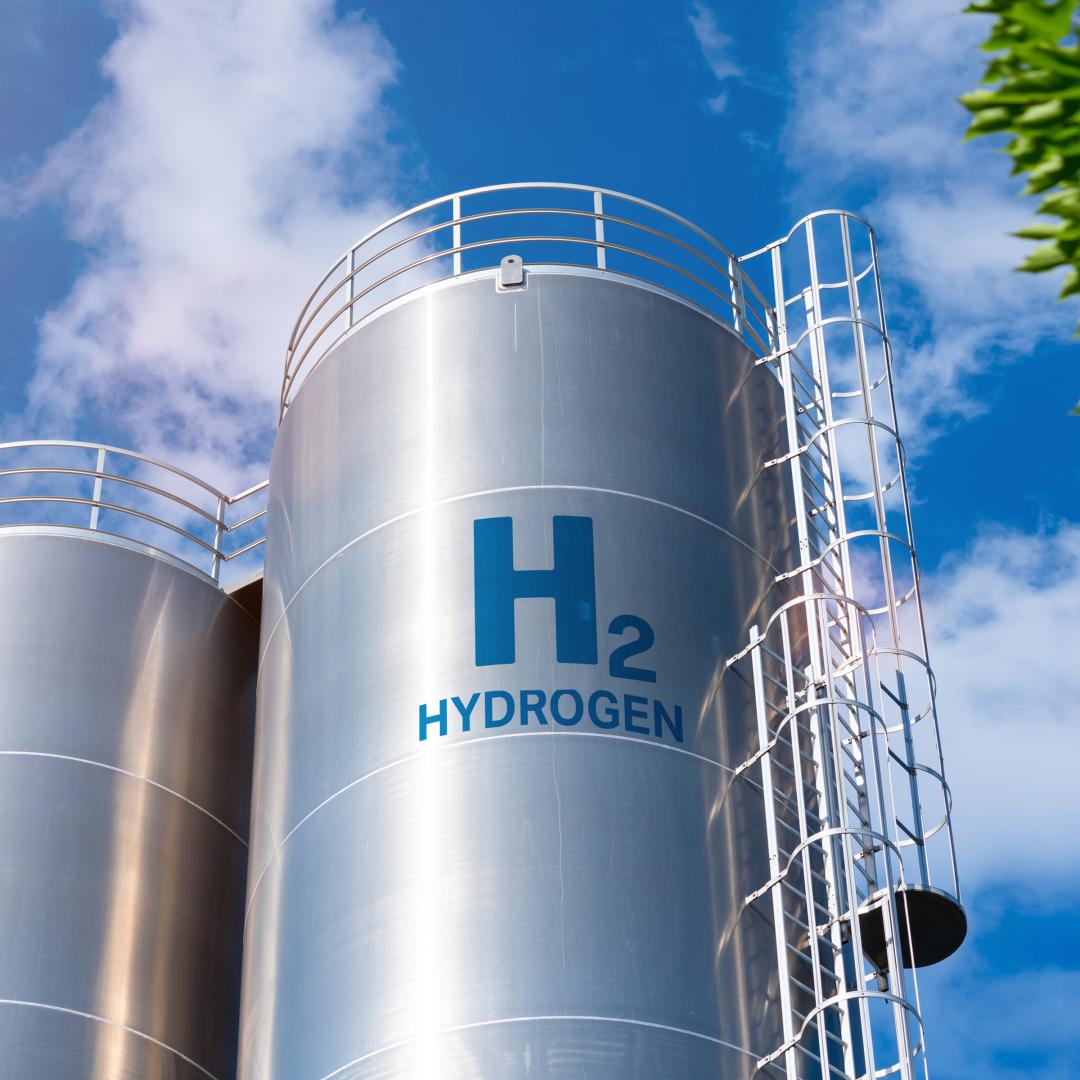Ajanovic, A., Sayer, M., & Haas, R. (2022). The economics and the environmental benignity of different colors of hydrogen. International Journal of Hydrogen Energy, 47(57), 24136–24154. Link to source: https://doi.org/10.1016/j.ijhydene.2022.02.094
Arcos, J. M. M., & Santos, D. M. F. (2023). The hydrogen color spectrum: Techno-economic analysis of the available technologies for hydrogen production. Gases, 3(1), Article 1. Link to source: https://doi.org/10.3390/gases3010002
Bauer, C., Treyer, K., Antonini, C., Bergerson, J., Gazzani, M., Gencer, E., Gibbins, J., Mazzotti, M., McCoy, S. T., McKenna, R., Pietzcker, R., Ravikumar, A. P., Romano, M. C., Ueckerdt, F., Vente, J., & Spek, M. van der. (2021). On the climate impacts of blue hydrogen production. Sustainable Energy & Fuels, 6(1), 66–75. Link to source: https://doi.org/10.1039/D1SE01508G
Blank, T. K., Molloy, P., Ramirez, K., Wall, A., & Weiss, T. (2022, April 13). Clean energy 101: The colors of hydrogen. RMI. Link to source: https://rmi.org/clean-energy-101-hydrogen/
Collodi, G., Azzaro, G., Ferrari, N., & Santos, S. (2017). Techno-economic evaluation of deploying CCS in SMR based merchant H2 production with NG as feedstock and fuel. Energy Procedia, 114, 2690–2712. Link to source: https://doi.org/10.1016/j.egypro.2017.03.1533
Gorski, J., Jutt, T., & Wu, K. T. (2021). Carbon intensity of blue hydrogen production. Link to source: https://www.pembina.org/reports/carbon-intensity-of-blue-hydrogen-revised.pdf
Hossain Bhuiyan, M. M., & Siddique, Z. (2025). Hydrogen as an alternative fuel: A comprehensive review of challenges and opportunities in production, storage, and transportation. International Journal of Hydrogen Energy, 102, 1026–1044. Link to source: https://doi.org/10.1016/j.ijhydene.2025.01.033
Howarth, R. W., & Jacobson, M. Z. (2021). How green is blue hydrogen? Energy Science & Engineering, 9(10), 1676–1687. Link to source: https://doi.org/10.1002/ese3.956
IEA. (2019). The future of hydrogen. Link to source: https://iea.blob.core.windows.net/assets/9e3a3493-b9a6-4b7d-b499-7ca48e357561/The_Future_of_Hydrogen.pdf
IEA. (2023a). Hydrogen: Net zero emissions guide. Link to source: https://www.iea.org/reports/hydrogen-2156#overview
IEA. (2023b). Net zero roadmap: A global pathway to keep the 1.5 °C goal in reach. Link to source: https://www.iea.org/reports/net-zero-roadmap-a-global-pathway-to-keep-the-15-0c-goal-in-reach
IEA. (2024). Global hydrogen review 2024. Link to source: https://www.iea.org/reports/global-hydrogen-review-2024
IEA. (2025, February). Hydrogen. Link to source: https://www.iea.org/energy-system/low-emission-fuels/hydrogen
Ighalo, J. O., & Amama, P. B. (2024). Recent advances in the catalysis of steam reforming of methane (SRM). International Journal of Hydrogen Energy, 51, 688–700. Link to source: https://doi.org/10.1016/j.ijhydene.2023.10.177
Incer-Valverde, J., Korayem, A., Tsatsaronis, G., & Morosuk, T. (2023). “Colors” of hydrogen: Definitions and carbon intensity. Energy Conversion and Management, 291, 117294. Link to source: https://doi.org/10.1016/j.enconman.2023.117294
Lewis, E., McNaul, S., Jamieson, M., Henriksen, M. S., Matthews, H. S., White, J., Walsh, L., Grove, J., Shultz, T., Skone, T. J., & Stevens, R. (2022). Comparison of commercial, state-of-the-art, fossil-based hydrogen production technologies. Link to source: https://netl.doe.gov/projects/files/ComparisonofCommercialStateofArtFossilBasedHydrogenProductionTechnologies_041222.pdf
Massarweh, O., Al-khuzaei, M., Al-Shafi, M., Bicer, Y., & Abushaikha, A. S. (2023). Blue hydrogen production from natural gas reservoirs: A review of application and feasibility. Journal of CO2 Utilization, 70, Article 102438. Link to source: https://doi.org/10.1016/j.jcou.2023.102438
Massarweh, O., Bicer, Y., & Abushaikha, A. (2025). Technoeconomic analysis of hydrogen versus natural gas considering safety hazards and energy efficiency indicators. Scientific Reports, 15, Article 29601. Link to source: https://doi.org/10.1038/s41598-025-14686-6
Pettersen, J., Steeneveldt, R., Grainger, D., Scott, T., Holst, L.-M., & Hamborg, E. S. (2022). Blue hydrogen must be done properly. Energy Science & Engineering, 10(9), 3220–3236. Link to source: https://doi.org/10.1002/ese3.1232
Romano, M. C., Antonini, C., Bardow, A., Bertsch, V., Brandon, N. P., Brouwer, J., Campanari, S., Crema, L., Dodds, P. E., Gardarsdottir, S., Gazzani, M., Jan Kramer, G., Lund, P. D., Mac Dowell, N., Martelli, E., Mastropasqua, L., McKenna, R. C., Monteiro, J. G. M.-S., Paltrinieri, N., … Wiley, D. (2022). Comment on “How green is blue hydrogen?” Energy Science & Engineering, 10(7), 1944–1954. Link to source: https://doi.org/10.1002/ese3.1126
Roy, R., Antonini, G., Hayibo, K. S., Rahman, M. M., Khan, S., Tian, W., Boutilier, M. S. H., Zhang, W., Zheng, Y., Bassi, A., & Pearce, J. M. (2025). Comparative techno-environmental analysis of grey, blue, green/yellow and pale-blue hydrogen production. International Journal of Hydrogen Energy, 116, 200–210. Link to source: https://doi.org/10.1016/j.ijhydene.2025.03.104
Sun, T., Shrestha, E., Hamburg, S. P., Kupers, R., & Ocko, I. B. (2024). Climate impacts of hydrogen and methane emissions can considerably reduce the climate benefits across key hydrogen use cases and time scales. Environmental Science & Technology, 58(12), 5299–5309. Link to source: https://doi.org/10.1021/acs.est.3c09030
Udemu, C., & Font-Palma, C. (2024). Potential cost savings of large-scale blue hydrogen production via sorption-enhanced steam reforming process. Energy Conversion and Management, 302, 118132. Link to source: https://doi.org/10.1016/j.enconman.2024.118132
Vallejo, V., Nguyen, Q., & Ravikumar, A. P. (2024). Geospatial variation in carbon accounting of hydrogen production and implications for the US Inflation Reduction Act. Nature Energy, 9(12), 1571–1582. Link to source: https://doi.org/10.1038/s41560-024-01653-0
Wu, W., Zhai, H., & Holubnyak, E. (2024). Technological evolution of large-scale blue hydrogen production toward the U.S. Hydrogen Energy Earthshot. Nature Communications, 15(1), 5684. Link to source: https://doi.org/10.1038/s41467-024-50090-w



